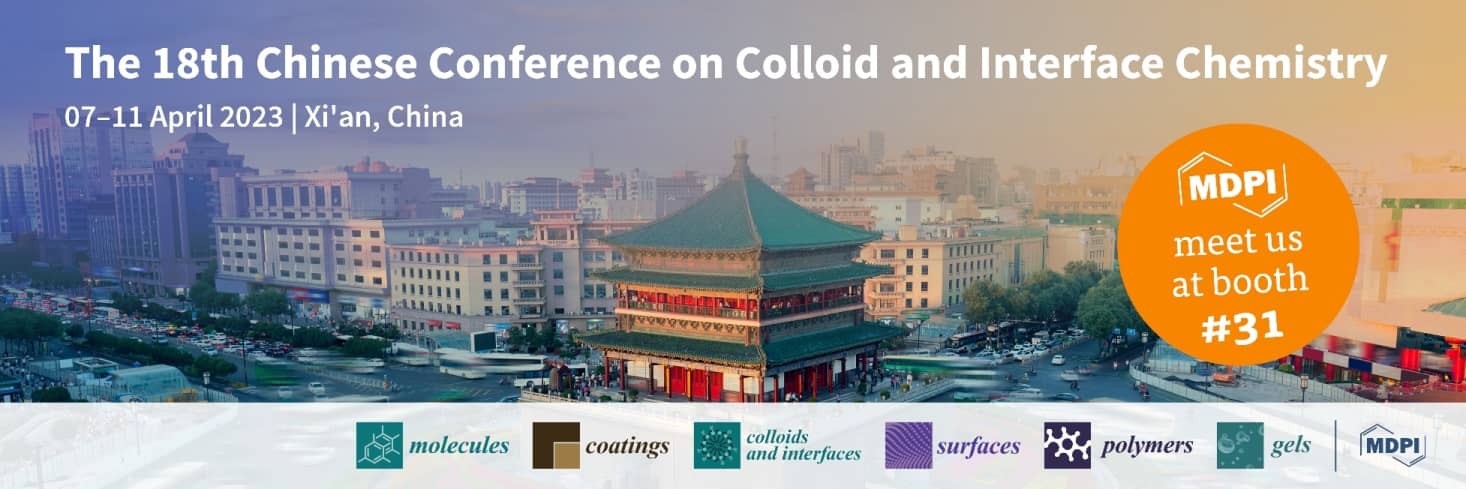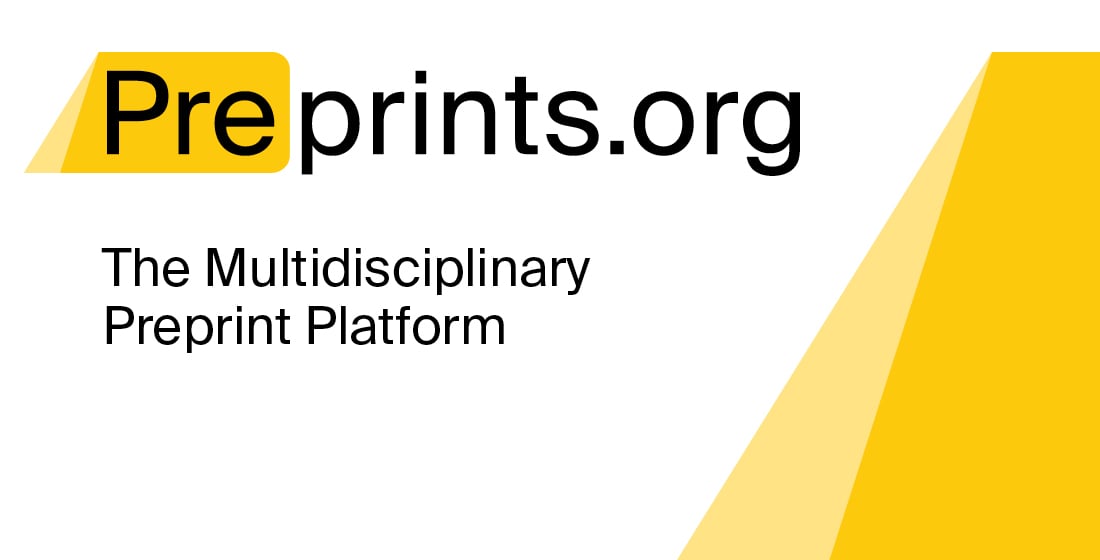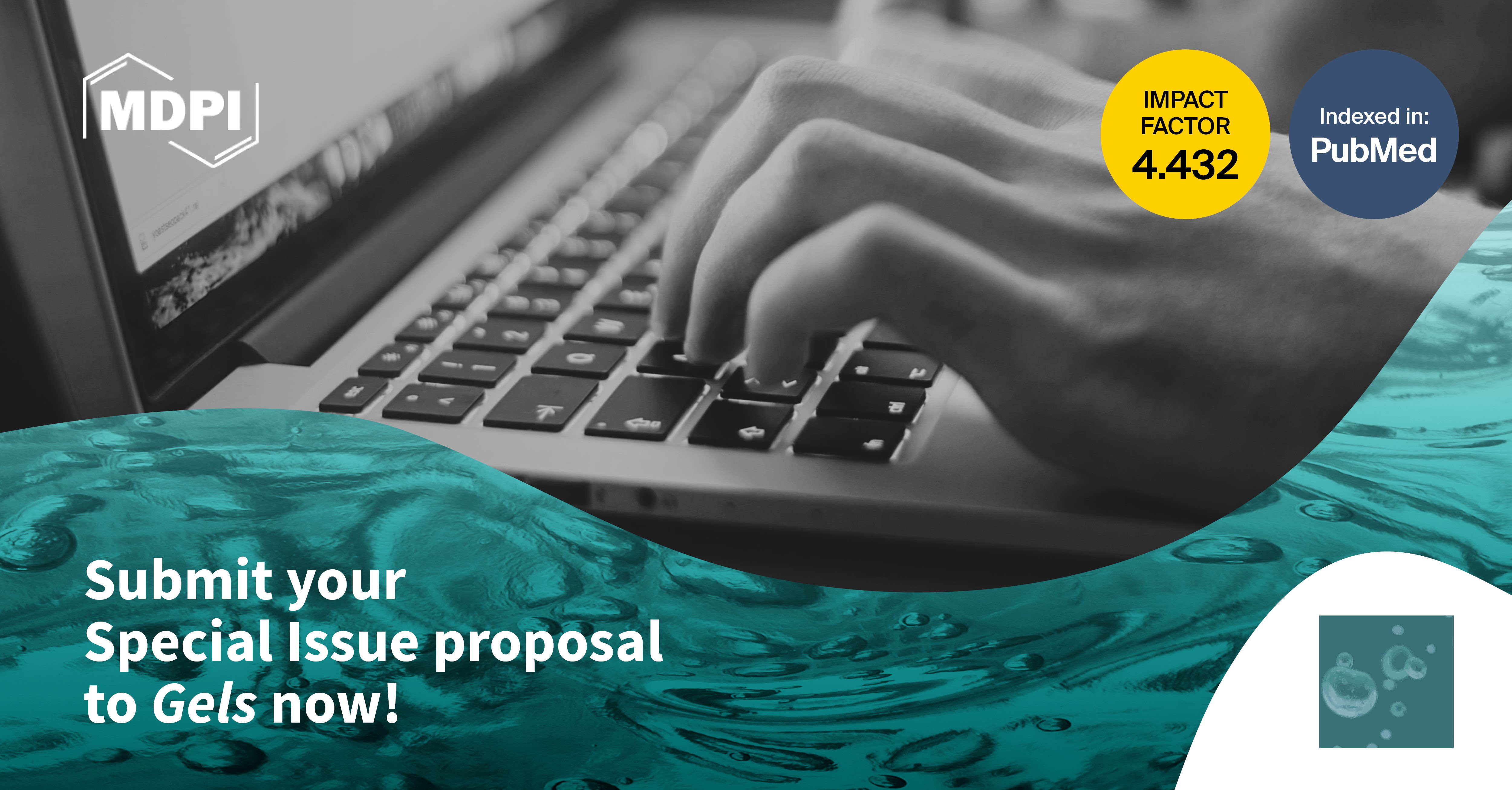
Journal Menu
► ▼ Journal Menu-
- Gels Home
- Aims & Scope
- Editorial Board
- Reviewer Board
- Topical Advisory Panel
- Instructions for Authors
- Special Issues
- Topics
- Sections & Collections
- Article Processing Charge
- Indexing & Archiving
- Editor’s Choice Articles
- Most Cited & Viewed
- Journal Statistics
- Journal History
- Journal Awards
- Conferences
- Editorial Office
- 10th Anniversary
Journal Browser
► ▼ Journal BrowserNeed Help?
Announcements
7 March 2023
Meet Us at the 18th Chinese Conference on Colloid and Interface Chemistry (CCIC18), 7–11 April 2023, Xi’an, China

MDPI will be attending the 18th Chinese Conference on Colloid and Interface Chemistry (CCIC18), hosted by the Colloid and Interface Chemistry Professional Committee of the Chinese Chemical Society and Shaanxi Normal University, which will be held from 7 to 11 April 2023 in Xi’an, China.
This conference will exchange hot topics, research progress, development trends, personnel training in the field of colloid and interface chemistry, and the important application of colloid and interface chemistry in industrial and agricultural production through conference reports, invited reports, oral presentations, and posters. A total of 2000 delegates are expected to attend.
The main topics of the conference include the following: new theories and technologies in colloid and interface chemistry; ordered assembly of amphiphilic molecules; soft matter chemistry and supramolecular assembly; functional micro-nano materials; superwetting interface and material transport; optoelectronic functional assemblies and surface interfaces; biomolecular self-assembly and biocolloids; colloid motors; food colloids; applied colloid; and interface chemistry.
The following MDPI journals will be represented:
If you plan on attending this conference, please feel free to stop by our booth (#31) and start a conversation with us. Our delegates look forward to meeting you in person and answering any questions that you may have. For more information about the conference, please visit: https://www.nccic18.cn/.
7 March 2023
Displaying Co-Authors’ Email Addresses on the Webpage of Published Papers
MDPI is pleased to announce that we now display the co-authors’ email addresses in addition to the corresponding author’s email address on the webpage of published papers, protected by Captcha. For more information about this change, please visit the journal’s instructions for authors page.
We believe this change will facilitate academic discussions and advance our cause of open science and research. The corresponding authors are responsible for communicating with their co-authors and indicating in our system (https://susy.mdpi.com/) if co-authors would prefer for their email addresses not to be displayed.
16 February 2023
Increasing Visibility for Preprints.org – Clarivate adds the Preprint Citation Index to the Web of Science

On 9 February 2023, Clarivate, a global leader in providing trusted insights and analytics, added the Preprint Citation Index to the Web of Science platform, streamlining the research process by allowing researchers to locate and link to preprints alongside other trusted content in the database.
The Preprint Citation Index will act as a bridge to connect cutting-edge preprints with peer-reviewed journal articles published within the Web of Science Core Collection. Alerts can be easily set to monitor new research across several repositories and authors will also be able to include preprints on their Web of Science Research Profile to more accurately display their various research outputs.
As of its launch, the Preprint Citation Index will provide nearly two million preprints from various repositories, including MDPI’s own Preprints.org.
MDPI's Preprints Platform – Preprints.org
To advance Open Science and the fast dissemination of research, MDPI offers researchers a free multidisciplinary preprint platform. Preprints.org accepts submissions from all research areas and offers authors high visibility, permanent archiving, article-level Metrics and immediately citable content by assigning a Digital Object Identifier (DOI) to all preprints.
During submission to any MDPI journal, authors have the option to share their research as a preprint. After an initial screening, the manuscript is available online in 48 hours or less. Once online, preprints can be downloaded, shared, commented on, and cited, providing authors maximum visibility.
We invite you to join the ranks of the over 100k researchers using Preprints.org and share your research.
For more information, please visit Preprints.org.
1 February 2023
Gels | Top 10 Cited Articles in 2022
1. “Electrospun Core (HPMC–Acetaminophen)–Shell (PVP–Sucralose) Nanohybrids for Rapid Drug Delivery”
by Xinkuan Liu, Mingxin Zhang, Wenliang Song, Yu Zhang, Deng-Guang Yu and Yanbo Liu
Gels 2022, 8(6), 357; https://doi.org/10.3390/gels8060357
Available online: https://www.mdpi.com/2310-2861/8/6/357
2. “Natural Hydrogel-Based Bio-Inks for 3D Bioprinting in Tissue Engineering: A Review”
by Ahmed Fatimi, Oseweuba Valentine Okoro, Daria Podstawczyk, Julia Siminska-Stanny and Amin Shavandi
Gels 2022, 8(3), 179; https://doi.org/10.3390/gels8030179
Available online: https://www.mdpi.com/2310-2861/8/3/179
3. “Evaluation of Artificial Intelligence Methods to Estimate the Compressive Strength of Geopolymers”
by Yong Zou, Chao Zheng, Abdullah Mossa Alzahrani, Waqas Ahmad, Ayaz Ahmad, Abdeliazim Mustafa Mohamed, Rana Khallaf and Samia Elattar
Gels 2022, 8(5), 271; https://doi.org/10.3390/gels8050271
Available online: https://www.mdpi.com/2310-2861/8/5/271
4. “Recent Advances in Zwitterionic Hydrogels: Preparation, Property, and Biomedical Application”
by Sihang Liu, Jingyi Tang, Fangqin Ji, Weifeng Lin and Shengfu Chen
Gels 2022, 8(1), 46; https://doi.org/10.3390/gels8010046
Available online: https://www.mdpi.com/2310-2861/8/1/46
5. “Preparation and Evaluation of Chitosan/PVA Based Hydrogel Films Loaded with Honey for Wound Healing Application”
by Hitesh Chopra, Shabana Bibi, Sandeep Kumar, Muhammad Saad Khan, Pradeep Kumar and Inderbir Singh
Gels 2022, 8(2), 111; https://doi.org/10.3390/gels8020111
Available online: https://www.mdpi.com/2310-2861/8/2/111
6. “Chitosan/Pluronic F127 Thermosensitive Hydrogel as an Injectable Dexamethasone Delivery Carrier”
by Jomarien García-Couce, Miriela Tomás, Gastón Fuentes, Ivo Que, Amisel Almirall and Luis J. Cruz
Gels 2022, 8(1), 44; https://doi.org/10.3390/gels8010044
Available online: https://www.mdpi.com/2310-2861/8/1/44
7. “Inherent and Composite Hydrogels as Promising Materials to Limit Antimicrobial Resistance”
by Rahela Carpa, Alexei Remizovschi, Carla Andreea Culda and Anca Livia Butiuc-Keul
Gels 2022, 8(2), 70; https://doi.org/10.3390/gels8020070
Available online: https://www.mdpi.com/2310-2861/8/2/70
8. “Improving the Self-Healing of Cementitious Materials with a Hydrogel System”
by Hao Wang, Mohammad Habibi, Riadh Marzouki, Ali Majdi, Morteza Shariati, Nebojsa Denic, Aleksandar Zakić, Majid Khorami, Mohamed Amine Khadimallah and Ahmed Abdel Khalek Ebid
Gels 2022, 8(5), 278; https://doi.org/10.3390/gels8050278
Available online: https://www.mdpi.com/2310-2861/8/5/278
9. “Functional Hydrogels for Treatment of Chronic Wounds”
by Ilayda Firlar, Mine Altunbek, Colleen McCarthy, Murugan Ramalingam and Gulden Camci-Unal
Gels 2022, 8(2), 127; https://doi.org/10.3390/gels8020127
Available online: https://www.mdpi.com/2310-2861/8/2/127
by Ana C. Branco, Andreia S. Oliveira, Inês Monteiro, Pedro Nolasco, Diana C. Silva, Célio G. Figueiredo-Pina, Rogério Colaço and Ana P. Serro
Gels 2022, 8(3), 143; https://doi.org/10.3390/gels8030143
Available online: https://www.mdpi.com/2310-2861/8/3/143
22 December 2022
Special Issue Mentor Program
We are pleased to announce the launch of a new initiative—the MDPI Special Issue Mentor Program.
This program will enable early career researchers (who must hold a Ph.D. in a related field) to experience editing a Special Issue in MDPI journals, under the mentorship of our experienced Editorial Board Members or other experienced scientists. The mentor program will provide an excellent opportunity for early career scientists to gain editorial experience, and to cultivate their ability to edit scientific research.
The mentee’s responsibilities include:
- Proposing a Special Issue title and assisting the mentor in preparing a summary (around 200–400 words) and 3–10 keywords describing the background, importance, and goal of the Issue;
- Writing a brief promotion plan for the Special Issue;
- Preparing a list of scholars who may be interested in the Issue and personally e-mailing invitations on behalf of Guest Editors;
- Writing an editorial for the online Special Issue together with the mentor.
The mentor’s responsibilities include:
- Conducting a final check before the Special Issue is published online;
- Performing editorial control of the Special Issue and quality control of the publications, both of which must be carried out in a timely manner;
- Providing suggestions to younger scholars if they have any doubts or concerns regarding submissions;
- Organizing video calls with young scholars and the Editorial Office regularly to discuss problems and improvement suggestions for the Special Issue;
- Making and submitting decisions regarding submissions with the assistance of mentees.
Certificates and awards:
After the Special Issue closes, the Editorial Office will provide official certificates for all the mentors and early career researchers.
If you are interested in this opportunity, please send your Special Issue proposal to the Editorial Office of a journal you choose, and we will discuss the process (i.e., mentor collaboration, Special Issue topic feasibility analysis, etc.) in further detail. The full list of MDPI journals is as follows: https://www.mdpi.com/about/journals.
In addition to the new Special Issue Mentor Program, we will continue to welcome all Special Issue proposals focusing on hot research topics.
21 December 2022
Gels | Special Issue Mentor Program
We are pleased to announce the launch of a new initiative—the Special Issue Mentor Program.

This program intends to provide an opportunity for early career scientists to enhance their editing, networking, and organizational skills and to work closely with our journal to gain more editorial experience. Early career scientists who have novel ideas for new Gels Special Issues will act as Guest Editors under the mentorship of an experienced scientist; this mentor could be a member of the Editorial Board of Gels (ISSN: 2310-2861) or, for example, from other well-established research institutes or laboratories.
The mentee’s responsibilities include:
- Providing a CV, including a list of publications;
- Proposing a Special Issue title and a short introduction;
- Writing a brief promotion plan for the Special Issue;
- Writing an editorial for the online Special Issue;
- Reviewing and making decisions for submissions under the mentorship of our Editorial Board Members.
The mentor’s responsibilities include:
- Conducting a final check before the Special Issue is published online;
- Co-editing the Special Issue with the young scholars and performing quality control of the publications in the Special Issue;
- Providing suggestions to the young scholars if they have doubts or concerns regarding submissions;
- Organizing video calls with the young scholars and the office regularly to discuss problems and improvement suggestions for the Special Issue.
Certificates and awards:
When the Special Issue is closed, the Editorial Office will provide official certificates for all the mentors and mentees.
If you are interested in this opportunity, please send your Special Issue proposal to the Gels Editorial Office (gels@mdpi.com), and we will discuss the process (mentor collaboration, Special Issue topic feasibility analysis, etc.) in further detail.
In addition to the new Special Issue Mentor Program, Gels continues to welcome all Special Issue proposals based on hot research topics as usual.
Gels Editorial Office
14 December 2022
"Thanks a Million!" – One Million Articles Published in MDPI Journals
MDPI has just become the first open access (OA) publisher to reach the milestone of one million articles published. That is one million articles freely available to all, to circulate and build upon! We are proud to share this special moment with the global scientific community.
This landmark has been reached thanks to the immeasurable support of more than 600,000 expert reviewers, 66,000 editorial board members and 6700 hard-working colleagues across MDPI’s global offices.
Within more than 25 years of publishing, our journals received 2.1 million manuscripts and generated 4.6 million peer review reports to get to one million papers published.
Reaching the milestone of one million articles published reinforces our mission to remove any existing barriers and to make scientific research accessible to all. Since its inception, MDPI’s goal has been to create reliable processes to make science open. This is a path towards facilitating the dissemination of novel insights in scientific communities.
Regular feedback from authors and reviewers shows that our service is greatly appreciated and needed. At the same time, the feedback helps us identify areas for further improvement.
As it stands, a significant share of published research findings remain closed access. More than half of the content published with the most well-known legacy publishers stays behind a paywall, and that is not including articles published in hybrid OA journals, or made available months or years after publication.
A new policy announced by the US administration in August 2022 requires that, as of January 2026, all US federally funded research be made freely and immediately available after publication. While the new policy does not mandate articles be published under an open access license, it is aligned with the open access movement in removing all barriers to research. Similarly, some of the most advanced research institutions in the world intend to have all funded research articles published in open access by 2025.
MDPI is proud to be the leading agent of the transition to open access.
"Thanks a Million" to all the contributors!
8 December 2022
MDPI Sustainability Foundation: New Look and Nominations for the 2023 Sustainability Awards Now Open

We are pleased to announce that the website of the MDPI Sustainability Foundation has been revamped! For the past couple of months, our UX UI team and front-end developers have been working hard to launch the website in time for the opening of the Sustainability Awards nominations.
The website is not the only thing that has had a remodeling. Indeed, the format of the Emerging Sustainability Leader Award (ESLA) has been updated. ESLA is now a competition open to individual researchers or start-ups founded by researchers under the age of 35. Nominee applications will go through 2 rounds of selection until the final 3 are decided. The finalists will then be invited to give pitch presentations during the Award Ceremony to win either first place (10,000 USD) or runner-up (2 x 5000 USD).
The World Sustainability Award, on the other hand, remains the same: a total prize money of 100,000 USD is up for grabs by senior individual researchers or groups of researchers from the international research community.
Nominations for both the World Sustainability Award and the Emerging Sustainability Leader award are now open! Check out our new website for more information on how to nominate.
7 November 2022
Gels | Top 10 Cited Papers in 2020
1. “Coating and Functionalization Strategies for Nanogels and Nanoparticles for Selective Drug Delivery”
by Filippo Pinelli, Giuseppe Perale and Filippo Rossi
Gels 2020, 6(1), 6; https://doi.org/10.3390/gels6010006
Available online: https://www.mdpi.com/2310-2861/6/1/6
2. “Cryostructuring of Polymeric Systems. 55. Retrospective View on the More than 40 Years of Studies Performed in the A.N.Nesmeyanov Institute of Organoelement Compounds with Respect of the Cryostructuring Processes in Polymeric Systems”
by Vladimir I. Lozinsky
Gels 2020, 6(3), 29; https://doi.org/10.3390/gels6030029
Available online: https://www.mdpi.com/2310-2861/6/3/29
3. “Thermoresponsive Nanogels Based on Different Polymeric Moieties for Biomedical Applications”
by Sobhan Ghaeini-Hesaroeiye, Hossein Razmi Bagtash, Soheil Boddohi, Ebrahim Vasheghani-Farahani and Esmaiel Jabbari
Gels 2020, 6(3), 20; https://doi.org/10.3390/gels6030020
Available online: https://www.mdpi.com/2310-2861/6/3/20
4. “Quaternization of Composite Algal/PEI Beads for Enhanced Uranium Sorption—Application to Ore Acidic Leachate”
by Mohammed F. Hamza, Amal E. Mubark, Yuezou Wei, Thierry Vincent and Eric Guibal
Gels 2020, 6(2), 12; https://doi.org/10.3390/gels6020012
Available online: https://www.mdpi.com/2310-2861/6/2/12
5. “Stimuli-Responsive Hydrogels for Local Post-Surgical Drug Delivery”
by Esfandyar Askari, Amir Seyfoori, Meitham Amereh, Sadaf Samimi Gharaie, Hanieh Sadat Ghazali, Zahra Sadat Ghazali, Bardia Khunjush and Mohsen Akbari
Gels 2020, 6(2), 14; https://doi.org/10.3390/gels6020014
Available online: https://www.mdpi.com/2310-2861/6/2/14
6. “Tailoring Properties of Mixed-Component Oleogels: Wax and Monoglyceride Interactions Towards Flaxseed Oil Structuring”
by Noadia G. Barroso, Paula K. Okuro, Ana P. B. Ribeiro and Rosiane L. Cunha
Gels 2020, 6(1), 5; https://doi.org/10.3390/gels6010005
Available online: https://www.mdpi.com/2310-2861/6/1/5
7. “Bioprinted Three-Dimensional Cell-Laden Hydrogels to Evaluate Adipocyte-Breast Cancer Cell Interactions”
by Sarah Chaji, Jenna Al-Saleh and Cheryl T. Gomillion
Gels 2020, 6(1), 10; https://doi.org/10.3390/gels6010010
Available online: https://www.mdpi.com/2310-2861/6/1/10
8. “Characterization of Enriched Meat-Based Pâté Manufactured with Oleogels as Fat Substitutes”
by Artur J. Martins, José M. Lorenzo, Daniel Franco, Mirian Pateiro, Rubén Domínguez, Paulo E. S. Munekata, Lorenzo M. Pastrana, António A. Vicente, Rosiane L. Cunha and Miguel A. Cerqueira
Gels 2020, 6(2), 17; https://doi.org/10.3390/gels6020017
Available online: https://www.mdpi.com/2310-2861/6/2/17
9. “Matrix Remodeling and Hyaluronan Production by Myofibroblasts and Cancer-Associated Fibroblasts in 3D Collagen Matrices”
by Jiranuwat Sapudom, Claudia Damaris Müller, Khiet-Tam Nguyen, Steve Martin, Ulf Anderegg and Tilo Pompe
Gels 2020, 6(4), 33; https://doi.org/10.3390/gels6040033
Available online: https://www.mdpi.com/2310-2861/6/4/33
10. “New Horizons in Hydrogels for Methotrexate Delivery”
by Ali Dehshahri, Anuj Kumar, Vijay Sagar Madamsetty, Ilona Uzieliene, Shima Tavakol, Fereshteh Azedi, Hojjat Samareh Fekri, Ali Zarrabi, Reza Mohammadinejad and Vijay Kumar Thakur
Gels 2021, 7(1), 2; https://doi.org/10.3390/gels7010002
Available online: https://www.mdpi.com/2310-2861/7/1/2
7 November 2022
Gels | Issue Cover Articles in 2021
1. “Advances in Bio-Based Polymers for Colorectal Cancer Treatment: Hydrogels and Nanoplatforms”
by Anna Maspes, Fabio Pizzetti, Arianna Rossetti, Pooyan Makvandi, Giovanni Sitia and Filippo Rossi
Gels 2021, 7(1), 6; https://doi.org/10.3390/gels7010006
Available online: https://www.mdpi.com/2310-2861/7/1/6
2. “Experimental Verification of the Balance between Elastic Pressure and Ionic Osmotic Pressure of Highly Swollen Charged Gels”
by Tasuku Nakajima, Ken-ichi Hoshino, Honglei Guo, Takayuki Kurokawa and Jian Ping Gong
Gels 2021, 7(2), 39; https://doi.org/10.3390/gels7020039
Available online: https://www.mdpi.com/2310-2861/7/2/39
3. “Design and Fabrication of Sodium Alginate/Carboxymethyl Cellulose Sodium Blend Hydrogel for Artificial Skin”
by Kun Zhang, Yanen Wang, Qinghua Wei, Xinpei Li, Ying Guo and Shan Zhang
Gels 2021, 7(3), 115; https://doi.org/10.3390/gels7030115
Available online: https://www.mdpi.com/2310-2861/7/3/115
4. “Advanced Methods for the Characterization of Supramolecular Hydrogels”
by Bridget R. Denzer, Rachel J. Kulchar, Richard B. Huang and Jennifer Patterson
Gels 2021, 7(4), 158; https://doi.org/10.3390/gels7040158
Available online: https://www.mdpi.com/2310-2861/7/4/158




